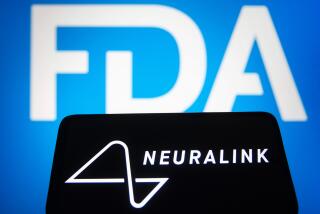Panel Backs Use of Genes for ‘Cancer Vaccine’ Work
- Share via
WASHINGTON — A key federal advisory committee Monday approved experimental use of gene therapy in attempts to develop a “cancer vaccine” that would immunize patients against their own tumors.
The National Institutes of Health Recombinant DNA Advisory Committee sanctioned the proposal by Dr. Steven A. Rosenberg, chief of surgery at the National Cancer Institute, who is considered a pioneer in human gene-therapy cancer research.
Rosenberg intends to extract tumor cells from patients with cancer in advanced stages, then genetically modify the cells to make them “foreign” to the body’s immune system. He will inject the altered cells back into the patient in an attempt to stimulate the immune system into attacking the cancer.
Rosenberg is expected to conduct the first “immunization” as soon as NIH Director Bernadine Healy gives the final approval, expected imminently.
The process involves removing a small piece of the patient’s tumor and inserting into the tissue genes coded for production of tumor necrosis factor or interleukin-2, natural immune-system substances.
The vaccine approach is a new twist in the infant field of human gene therapy. The human body is composed of about 50 trillion cells, each of which contains information that directs its function. The information is stored in genes, which are made up of DNA, the genetic blueprint of life. When a gene is destroyed or broken, the cell’s function is disturbed or eliminated--and disease occurs.
Human gene therapy has two basic approaches: A normal gene may be introduced into the body to attempt to correct a defective gene or replace a missing one, or genes may be used to assign a cell a new function or enhance its current function.
Earlier this year, Rosenberg began other gene-therapy experiments in patients with advanced melanoma, a lethal skin cancer. The results of those studies have not yet been reported.
Gene technology has been used in humans on two previous occasions. On Sept. 14, 1990, NIH performed the first human gene therapy experiment. A 4-year-old girl with adenosine deaminase deficiency, an inherited immune system disorder known to afflict about 30 children worldwide, was transfused with her own white blood cells that had been altered in the laboratory by addition of the human ADA gene. Scientists hope the added gene will stimulate production of adenosine deaminase, an enzyme crucial to the proper functioning of the immune system.
Earlier, Rosenberg inserted gene-altered cells into melanoma patients, but the genes had no therapeutic function. They were used only as “markers” to identify other cells so they could later be recovered from blood or biopsied tissue.






